If social media mattered in elections, Ron Paul would have likely been the Republican presidential candidate, not Mitt Romney. Despite being the conversational hub of the election, Facebook is neither the place where politically influential demographics congregate nor where undecided citizens go to think deeply about issues.
Our friends at The Atlantic ran a fascinating and well-researched piece about whether Facebook gave Democrats an advantage on Election Day, especially given their pull with young voters. Unfortunately, the article overestimates how political consequential young voters are, “If no one under the age of 30 had voted, Obama would have won every state he carried with the exception of two: Indiana and North Carolina,” wrote Chuck Todd and Sheldon Gawiser in How Barack Obama Won (in 2008).
The centerpiece of author Rebecca Rosen’s argument is a recent large-scale, randomized study, which proved that users who broadcast their intention to vote on Election Day can boost turnout among their friends. The study found that Facebook has an extraordinarily powerful effect on the spread of messages, essentially quadrupling the influence as friends share it throughout an ever expanding network. “Facebook’s effect — however big it is — is at the margins, and in a country where elections are so close, the margins can matter a lot,” surmises Rosen. Unfortunately, the total impact on turnout is only about 2 percent –a significant figure for a message, but not nearly enough to sway an election.
In response to questions about how the message impacted users, The study’s author, Dr. James Fowler, tells me over email, “older people were more influenced by the treatment in 2010, but there is no evidence that ideology played a role or that one party was more favored than another.” Additionally, he says, “one thing you might point out is that there was only a 1% increase in voter turnout among the young.”
Indeed, as I’ve argued before, the power of young voters is a myth. They comprise about 18 percent of the voting electorate (19 percent this year, if reports of slightly higher turnout are to be believed). Moreover, the once Obama-enchanted demographic of 20-somethings lost faith in the harbinger of hope, and his overall support among young voters dropped around 6 percent (probably from 66 percent to 60 percent).
In a state like Ohio, young voters may have made a difference (by about 12,000 votes), but not enough for Facebook to be the pivotal factor. Facebook only influences a fraction for any particular group — not enough to make up for Obama’s thumping of Romney.
The social media election myth may persist because it’s reasonable to believe that, given the sheer volume of activity on Facebook, ‘it has to have an effect, right?!‘. One explanation for the Grand Canyon-size discrepancy between action and online discussion is that the growth in social media has paralleled a new behavioral trend in young voters: the rise of non-voting civically engaged citizens. University of California, Irvine Professor Russell Dalton argues that this demographic finds more meaning in making political videos, attending an Occupy Wall Street camp, or boycotting companies with Republican ties than performing traditional acts of civic duty, such as voting or jury duty.
In fairness to non-voters, a single vote isn’t a terribly influential way to change government; so it’s reasonable that a generation of makers wants something more. Facebook has empowered countless new ways to engage with democracy, but young people have ceded their power in elections in the process.
Now, in fairness to The Atlantic, it is reasonable to suspect that the Internet does not have the exact same impact on both parties. I’ve argued before that the Internet inherently advantages liberals because, on average, their greater psychological embrace of disruption leads to more innovation (after all, nearly every major digital breakthrough, from online fundraising to the use of big data, was pioneered by Democrats).
But, for now, don’t get swept up in the social media hype. There are too many 20-somethings on Facebook and Twitter for social media to make much of a difference.
*A previous version of this article caused some confusion by rounding numbers and not explicitly incorporating the magnitude of Facebook in Ohio. If Obama won by 103,519 votes in Ohio, then the 2.2% effect by Facebook would not likely have swung the vote for Obama, especially since the Facebook effect is not partisan and slightly skewed towards older voters. Though, the margins are close and I’ll write a follow up once we have all the numbers and an update from Facebook on its effect for 2012.
